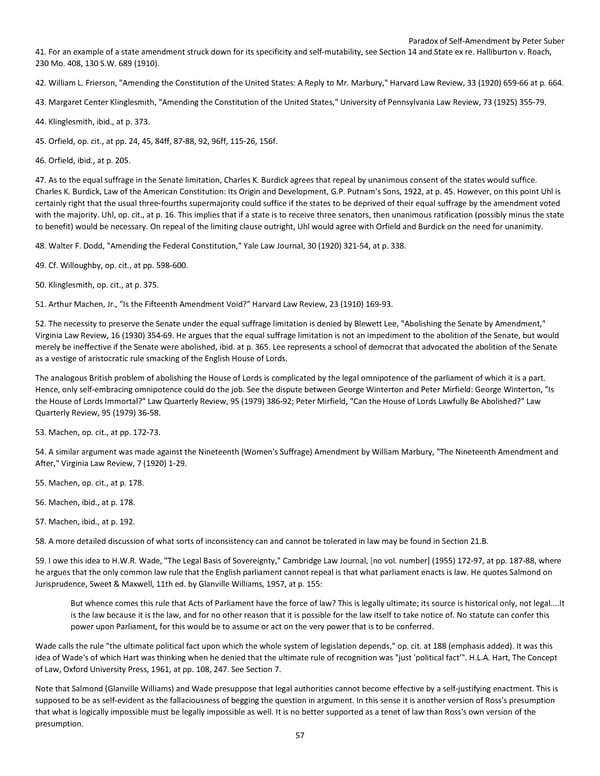Paradox of Self-Amendment by Peter Suber 41. For an example of a state amendment struck down for its specificity and self-mutability, see Section 14 and State ex re. Halliburton v. Roach, 230 Mo. 408, 130 S.W. 689 (1910). 42. William L. Frierson, "Amending the Constitution of the United States: A Reply to Mr. Marbury," Harvard Law Review, 33 (1920) 659-66 at p. 664. 43. Margaret Center Klinglesmith, "Amending the Constitution of the United States," University of Pennsylvania Law Review, 73 (1925) 355-79. 44. Klinglesmith, ibid., at p. 373. 45. Orfield, op. cit., at pp. 24, 45, 84ff, 87-88, 92, 96ff, 115-26, 156f. 46. Orfield, ibid., at p. 205. 47. As to the equal suffrage in the Senate limitation, Charles K. Burdick agrees that repeal by unanimous consent of the states would suffice. Charles K. Burdick, Law of the American Constitution: Its Origin and Development, G.P. Putnam's Sons, 1922, at p. 45. However, on this point Uhl is certainly right that the usual three-fourths supermajority could suffice if the states to be deprived of their equal suffrage by the amendment voted with the majority. Uhl, op. cit., at p. 16. This implies that if a state is to receive three senators, then unanimous ratification (possibly minus the state to benefit) would be necessary. On repeal of the limiting clause outright, Uhl would agree with Orfield and Burdick on the need for unanimity. 48. Walter F. Dodd, "Amending the Federal Constitution," Yale Law Journal, 30 (1920) 321-54, at p. 338. 49. Cf. Willoughby, op. cit., at pp. 598-600. 50. Klinglesmith, op. cit., at p. 375. 51. Arthur Machen, Jr., "Is the Fifteenth Amendment Void?" Harvard Law Review, 23 (1910) 169-93. 52. The necessity to preserve the Senate under the equal suffrage limitation is denied by Blewett Lee, "Abolishing the Senate by Amendment," Virginia Law Review, 16 (1930) 354-69. He argues that the equal suffrage limitation is not an impediment to the abolition of the Senate, but would merely be ineffective if the Senate were abolished, ibid. at p. 365. Lee represents a school of democrat that advocated the abolition of the Senate as a vestige of aristocratic rule smacking of the English House of Lords. The analogous British problem of abolishing the House of Lords is complicated by the legal omnipotence of the parliament of which it is a part. Hence, only self-embracing omnipotence could do the job. See the dispute between George Winterton and Peter Mirfield: George Winterton, "Is the House of Lords Immortal?" Law Quarterly Review, 95 (1979) 386-92; Peter Mirfield, "Can the House of Lords Lawfully Be Abolished?" Law Quarterly Review, 95 (1979) 36-58. 53. Machen, op. cit., at pp. 172-73. 54. A similar argument was made against the Nineteenth (Women's Suffrage) Amendment by William Marbury, "The Nineteenth Amendment and After," Virginia Law Review, 7 (1920) 1-29. 55. Machen, op. cit., at p. 178. 56. Machen, ibid., at p. 178. 57. Machen, ibid., at p. 192. 58. A more detailed discussion of what sorts of inconsistency can and cannot be tolerated in law may be found in Section 21.B. 59. I owe this idea to H.W.R. Wade, "The Legal Basis of Sovereignty," Cambridge Law Journal, [no vol. number] (1955) 172-97, at pp. 187-88, where he argues that the only common law rule that the English parliament cannot repeal is that what parliament enacts is law. He quotes Salmond on Jurisprudence, Sweet & Maxwell, 11th ed. by Glanville Williams, 1957, at p. 155: But whence comes this rule that Acts of Parliament have the force of law? This is legally ultimate; its source is historical only, not legal....It is the law because it is the law, and for no other reason that it is possible for the law itself to take notice of. No statute can confer this power upon Parliament, for this would be to assume or act on the very power that is to be conferred. Wade calls the rule "the ultimate political fact upon which the whole system of legislation depends," op. cit. at 188 (emphasis added). It was this idea of Wade's of which Hart was thinking when he denied that the ultimate rule of recognition was "just 'political fact'". H.L.A. Hart, The Concept of Law, Oxford University Press, 1961, at pp. 108, 247. See Section 7. Note that Salmond (Glanville Williams) and Wade presuppose that legal authorities cannot become effective by a self-justifying enactment. This is supposed to be as self-evident as the fallaciousness of begging the question in argument. In this sense it is another version of Ross's presumption that what is logically impossible must be legally impossible as well. It is no better supported as a tenet of law than Ross's own version of the presumption. 57
 The Paradox of Self-Amendment Page 76 Page 78
The Paradox of Self-Amendment Page 76 Page 78